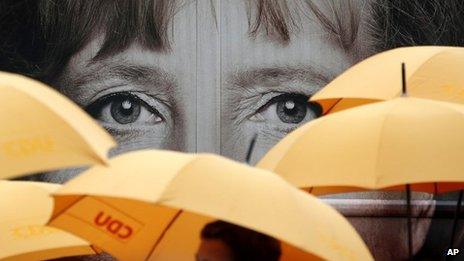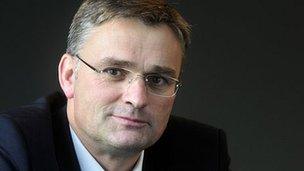Viewpoints: Angela Merkel's record
- Published

After eight years as Chancellor, Angela Merkel seems to have been given a resounding endorsement by the German electorate.
But there are plenty of people - both within Germany, and especially elsewhere in Europe - who think she has been the wrong leader at the wrong time.
Here, two distinguished German journalists present opposing views of her record.
'She can be proud' - Stefan Kornelius

Angela Merkel is about to join a very exclusive club. If she wins on Sunday evening, she will be one of three chancellors in post-war history to serve a third term.
Only Konrad Adenauer and Helmut Kohl are members of that club. The ever un-emotional Mrs Merkel will feel deep gratification following her conservative predecessors.
But Mrs Merkel is not yet chasing fame. There is unfinished business to take care of. And though the chancellor will be savvy about this historical opportunity, she also knows that the verdict on her policies is still out. Exhibit No 1 will be the rescue operation for Europe's currency. That is far from being over yet.
Already, Mrs Merkel can be proud of her achievements. She is not only the first woman in the top leadership position in Germany, she also is an impressive late starter in politics, after spending the first 35 years of her life behind the Iron Curtain. She learned fast and showed courage, when she pushed her mentor, former Chancellor Helmut Kohl, out of her way after he became hopelessly engulfed in a party finance scandal.
When Mrs Merkel took office in 2005 nobody expected her to last for long. Already, on election night, there was a revolt brewing in her camp and she only survived by a stroke of luck. Also, her second term started disastrously. For almost three years the governing coalition was paralysed by in-fights and incompetence, mainly from her coalition partner, the Free Democrats.
Miraculously, Mrs Merkel survived and even benefited personally from the weaknesses of her cabinet. The euro crisis helped - even when the daunting scope of the problem became visible. Actually, it was the crisis which made Mrs Merkel strong. Without the crisis, she would have been just another chancellor in the currents of history. Now, she had a momentous challenge to live up to. The spotlights were all on her.
Mrs Merkel not only led Europe's economic powerhouse to new strength, despite the turmoil all around - she also kept a calm and steady hand steering the EU through its most existential crisis ever. She resisted all pressures to flood the markets with ever more money, but insisted on her bitter prescription: assistance, in return for reforms.
She has never talked about it much, but her most pressing concern was never the currency alone. She truly worries about Europe's ability to maintain its value system in a globalised world, with fast moving tiger economies roving the globe in search for weakened prey.
Mrs Merkel does not voice her true concerns often. She dislikes sounding pompous and overly emotional. She prefers a steady and calm decision-making process. She can show utter coolness in the most heated arguments. But most of those qualities will not count for much unless she gets her job done and can be judged on the results.
This is why it would make a fascinating spectacle to watch her navigate through a third term and take the turns towards finally solving the euro crisis. Will she show more leadership in Europe? Is she prepared to spend some of the political capital she has amassed? For many, Mrs Merkel is still shrouded in mystery - an enigma after eight years in office. However, she is not that difficult to read. She just has not delivered yet.
Stefan Kornelius is foreign editor of Sueddeutsche Zeitung and author of Angela Merkel. The Chancellor and her World, Alma Books, London
'A mess of her making' - Alan Posener

Angela Merkel, her admirers say, has steered Germany almost unscathed through the financial crash of 2008 and the subsequent euro crisis, emerging as the undisputed leader of Europe.
True. But what has made Germany so strong is mainly the weakness of others. And though Vorsprung durch Technik (Progress through technology) helps explain Germany's strength, the huge low-wage sector - as a proportion of the workforce, it is the largest in Europe - is probably more important. Low wages are subsidised by the taxpayer via welfare payments to people with full-time jobs who do not earn enough to support themselves.
Add to this the fact that in relation to the strength of German industry, the euro is undervalued - which aids German exports to the USA and China - and the Merkel miracle does not seem all that miraculous.
Mrs Merkel's aversion to strategic thinking also means that Germany is not facing up to the three most pressing problems it faces in the years ahead: demographics, energy and, of course, Europe.
Demographics: Unlike, say, Britain or France, Germany's population is set to shrink in the next 20 years. Germany's GDP and share of world trade will shrink accordingly to about the level of the UK. Unless more women and immigrants enter the workforce, Germany will not be able to keep its place in the world - or take care of its ageing population.
Yet a new law pays women to stay home and take care of their kids. These benefits will encourage poorer women with an immigrant background to stay at home, which will mean that their children do not learn German and will enter school with a built-in disadvantage, reinforcing racial and Islamophobic stereotypes which are already at worrying levels.
Female board members and business leaders generally are still a rarity, as are immigrant policemen, teachers and other civil servants - especially immigrant women in those jobs. There are no programmes of affirmative action or quotas in place to redress these imbalances.
Energy: Germany already produces more renewable energy than it can consume - at least on sunny, windy days. German roofs are covered with solar panels, German fields dotted with huge wind generators. Good news?
Well, no, because utilities are required by law to buy renewable electricity at a fixed price and feed it into the grid. The "green" glut has not led to falling prices. On the contrary. Consumers are seeing their bills go up by 20-30%. Industry is complaining, too. There is talk of capping energy prices but who is going to pick up the tab?
Europe: It is obvious that the European Union has lost its way. With the so-called fiscal compact, or "Economic and Currency Union", Mrs Merkel has created a club within the club - a group of countries governed by their own rules, not beholden to the institutions of the "old" EU.
The eurozone itself is divided into a rich lender - Germany - and a gaggle of poor borrowers. The debtor countries hate Germany for - as they see it - imposing austerity while the Germans dislike the southern debtors for what they see as profligacy.
Meanwhile, Europe is not only losing what little power it had to influence events in its neighbourhood, it cannot even ensure that its own members abide by the rules. Corruption, racism and anti-Semitism are rampant in places like Greece, Romania, Bulgaria and Hungary.
The EU is in a mess, and it is mostly of Mrs Merkel's making.
Alan Posener is political correspondent for Die Welt